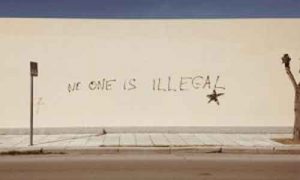 The Constitutional Court’s decision to give space for local religions to be included in the Identity Card (KTP) and Family Card (KK) column is a breath of fresh air for the lives of the devotees and humanitarian activists. With the granting of the request for judicial review number 97/PUU-XIV/2016, the devotees have the legal standing to restore their human dignity to the position of equal citizens. This recognition is at the same time the basis for the fulfillment of constitutional rights that they have so far not received from the state. In its decision on November 7, 2018, the Panel of Judges was of the opinion that the word “religion” in Article 61 Paragraph (1) and Article 64 Paragraph (1) is against the 1945 Constitution and does not have legally binding force conditionally as long as it does not belong to a belief. This means that adherents of a faith belief have the same legal position as adherents of the six religions that have been recognized by the government in obtaining rights related to population administration.
The Constitutional Court’s decision to give space for local religions to be included in the Identity Card (KTP) and Family Card (KK) column is a breath of fresh air for the lives of the devotees and humanitarian activists. With the granting of the request for judicial review number 97/PUU-XIV/2016, the devotees have the legal standing to restore their human dignity to the position of equal citizens. This recognition is at the same time the basis for the fulfillment of constitutional rights that they have so far not received from the state. In its decision on November 7, 2018, the Panel of Judges was of the opinion that the word “religion” in Article 61 Paragraph (1) and Article 64 Paragraph (1) is against the 1945 Constitution and does not have legally binding force conditionally as long as it does not belong to a belief. This means that adherents of a faith belief have the same legal position as adherents of the six religions that have been recognized by the government in obtaining rights related to population administration.
In an effort to encourage the fulfillment of citizenship rights of the indigenous people, the Indonesian Institute for Science (LIPI) together with its working network for the advocacy of indigenous communities have initiated several concrete steps, one of which is through the International Conference on Indigenous Religion (ICIR) which was held on December 13-17, 2020. This event is the second after the first was held in 2019 following the decision of The Constitutional Court No. 97/2016. The ICIR, itself, is a shared house that facilitates devotees, activists, academics, and even policy makers who are concerned with this issue to explore effective methods, initiate consolidation, and build intersectoral collaboration to pursue inclusive democracy.
The ICIR network including LIPI, the Indonesian Consortium for Religious Studies (ICRS), the Center for Religious and Cross-Cultural Studies (CRCS), Satu Nama, the National Commission on Violence Against Women, PUSAD, Program Peduli, Majelis Luhur Kepercayaan, Javanese Islam Research Institute IAIN Tulung Agung, and Puan Hayati, fully supports the conference and believes that these kinds of programs are significant to build public awareness about the obligation to fulfill the indigenous peoples’ rights and their position as equal citizens. In order to emphasize their place in society and to persuade their involvement in nation building, the 2nd ICIR raised the theme “Centering the Margin through Intersectoral Collaboration” by inviting government officials, NGOs, researchers, academics, and communities of faith themselves.
The event presents a variety of perspectives on the lives of adherents as well as various challenges and opportunities for the fulfillment of citizenship rights. So far, the followers of indigenous faiths have faced various difficulties due to negative stigmas. They have difficulties in many respects regarding freedom of religion and access to public services. Therefore, the Constitutional Court 97/2016 decision provides hope for change for the community of worshipers to achieve their civil rights. Although not yet fully fulfilled, efforts to improve the human dignity of these communities are showing good progress.
In his keynote speech ‘Re-assembling Democracy: Cultural Festivals as Ways to Generate Approaches to Democracy, Citizenship and Ecology’ at the 2nd ICIR, Graham Harvey—professor from Open University, UK—touched on the importance of trans-indigenous encounters where different indigenous communities meet together to share understanding and find their places in this world. This kind of meeting needs to be carried out by various programs both through cultural performances that show the knowledge and culture of indigenous people as well as through official forums in the fields of education and diplomacy, such as seminars and international forums that bring together various indigenous peoples of the world.
Graham Harvey highlighted that cultural festivals build public awareness about indigenous peoples and encourage the formation of inclusive democracy. His research on the Riddu Riddu festival and biennial ORIGINS festival of First Nation in London shows that such cultural festivals serve as forums for indigenous communities to meet and greet the outside world. Through the dances performed by indigenous artists, indigenous community self-represent their culture and determine their own sovereignty. The audience is not only invited to witness various performances and creativity, but also to participate and engage with indigenous artists and activists at the cutting edge of cultural resistance, environmentalism, and spiritual tradition. A meeting like this creates a new culture, new experience, new understanding, and new knowledge in which indigenous peoples’ customs become open to new experiences and practices and audiences are exposed to new understandings about the indigenous cultures and knowledge. The openness and transformation that happens during the encounter is a vital part of setting up the democracy.
Indigenous communities also need to meet their other indigenous counterparts through forums. Their involvement in the United Nation is one of them. As they have a greater opportunity to influence public policy and that they even have a working definition that allows them to self-represent their identities, they can indigenize democracy, which for them is larger than human community involving as well non-human beings such as plants, animals, rocks, soil, water, rivers, and mountains. Nature has a voice to be heard because it is also part of the community and deserves respect.
In this world of interrelatedness, we are all connected to the world around us—living and non-living beings. And indigenous people have kinship and family relationships with plants and animals, and this makes the bond between them sturdier. Therefore, indigenous peoples need to engage in discussion on how the world should be managed to encourage participation of the world rather than just observation, and conversation with indigenous peoples rather than consultation.
Through various local community engagements in various events and discussions, as well as collaboration with various parties, efforts to increase public education about indigenous peoples are gaining more recognition. Samsul Maarif, one of the initiators of ICIR, emphasized the need to enlarge the scope of study on indigenous religions to not only review the experiences of indigenous communities as marginalized groups but also to delve the richness of their worldviews that are full of humanitarian values. The director of the Center for Religious and Cross-Cultural Studies proposed that strategies for advocacy should begin with those values and because research shows that the issues surrounding the indigenous community do not stand alone, but rather are connected to other problems. Cross-sectoral collaboration should be the strategy towards inclusive citizenship.
In his closing remarks, Ahmad Najib Burhani from the Indonesian Institute of Sciences stated that ICIR was intended as an educational medium as well as clarification of negative prejudices that had been aimed at groups of devotees. He emphasized that studies on indigenous religions should not place the local people as merely objects of research, but as teachers with various worldviews about life. So, he encourages mutual inclusion in which worshipers open up space for researchers to learn, while researchers contribute to the lives of devotees to elevate their civic position. The study of local groups should be directed for humanitarian purposes which is to build conversations between groups of believers and outside communities so that collaboration can be carried out to build inclusive citizenship.
Sumber: https://www.icrs.or.id/news/intersectoral-collaboration-for-inclusive-democracy-and-human-dignity





